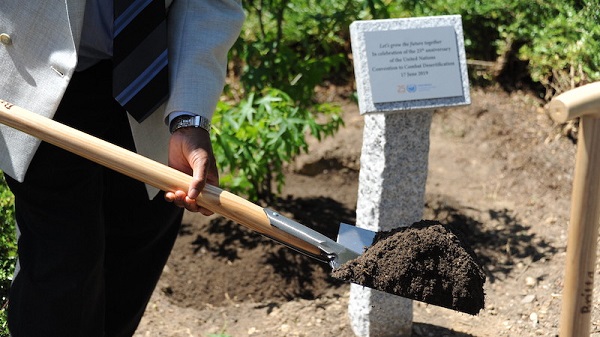
At a mid-year meeting of UNFCCC in Bonn this year in June a small group of countries led by Saudi Arabia have put the kybosh on any formal consideration of the IPCC Special Report on 1.5°C in the UNFCCC forum. Continue reading Saudis throw a spanner

At a mid-year meeting of UNFCCC in Bonn this year in June a small group of countries led by Saudi Arabia have put the kybosh on any formal consideration of the IPCC Special Report on 1.5°C in the UNFCCC forum. Continue reading Saudis throw a spanner
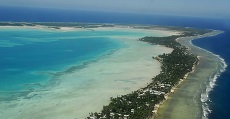 In this guest post by Geoff Henderson takes us to the heart of how climate change poses a real and present danger to some of our Pacific neighbours.
In this guest post by Geoff Henderson takes us to the heart of how climate change poses a real and present danger to some of our Pacific neighbours.
Kiribati – pron. Keer-i-bas – is perhaps the world’s most immediate victim of climate change. One hundred and ten thousand Kiribatians will likely be the first climate change refugees. It is happening right now, and they will be the first of millions over the next decades. This is a two-part post. Part one explains the people and livelihood of Kiribatians and explains their plight. Continue reading Climate refugees in the Central Pacific -the Republic of Kiribati
A miscellany this week, with an emphasis on Australian policy and opinion.
The main links for each item is in the heading.
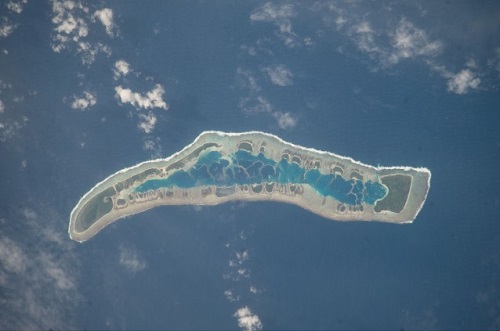
That’s Millenium Island in Kiribati which tops out at six metres above sea level. In parts of Kiribati the sea level is rising by 1.2 cm a year, about four times more than the global average.
Kiribati recently purchased eight square miles of land about 1,200 miles away on Vanua Levu, Fiji’s second-largest island. The immediate intention relates to food security. They will use the land for agriculture and aquatic farming.
That’s not a lot of land but Kiribati itself comprises just over 100,000 people scattered across 33 low-lying coral atolls totalling about 313 square miles.
The article notes that Kiribati’s reef structure can grow at 10 to 15 mm a year, faster than the IPCC expects sea level to rise, but it is not certain such growth in coral reefs translates to habitable land. My expectation is that later in this century sea level rise will far outstrip any coral growth.
2. Australians unhappy over Coalition’s response to climate challenge
JWS Research on behalf of the Climate Institute found that 70% of Australians accept the mainstream scientific position that climate change is occurring, up 10% since 2012.
while more than half of respondents felt the federal government was the primary body which should address climate change, there was a negative rating of -18 when people were asked to rank the government’s performance.
This compares to a -1 rating from last year.
A mere 20% of those questioned said they are convinced that Tony Abbott is concerned about climate change, with 53% feeling that he isn’t. Nearly a third of people believe opposition leader Bill Shorten is worried about the problem, with around the same proportion of people thinking the reverse is true.
In a further blow to the Coalition, for the first time more people support carbon pricing than oppose it. According to the poll, 34% back the carbon pricing laws, up 6% on 2012. Public opposition to carbon pricing has collapsed by 22% since 2012, when the Coalition was repeatedly attacking the then Labor government over the policy, the poll found.
According to the poll, 47% of people think that carbon pricing is preferable to no climate change policy, with just 22% supporting the government’s alternative Direct Action policy…
3. Shorten vows to ‘re-litigate’ case for carbon pricing
He didn’t expect to have to but he’s prepared to argue the case from first principles. He says:
The real test of political leadership is a willingness to build consensus, to earn agreement, not just to yank the bell at the Downton Abbey political college and expect a servant class of obedient Australians to carry out your will.
Meanwhile confusion reigns in the public mind, so I wish Bill the best of luck. Essential Research found:
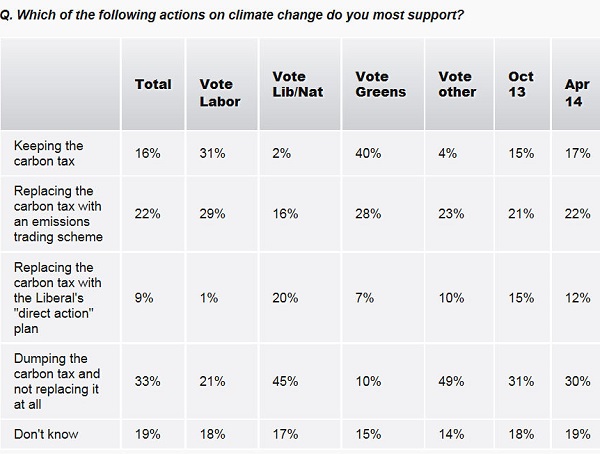
Support for Direct action is thin and fading in this survey at 9%. Doing nothing rates at 33% (up 3%), nearly matching the total of 38% favouring carbon pricing.
4. Great Barrier Reef tougher than thought
Scientists have put together temperatures from the Great Barrier Reef for the last 20,000 years and found that the reef has survived a range of temperatures.
They found that corals survived a 5°C rise between 20,000 years ago and 13,000 years ago. The reef is more resilient to temperature change than previously thought.
Nevertheless there are a few caveat’s to consider before a general outbreak of optimism,
Dr Helen McGregor, a Research Fellow at the Australian National University and a member of the research team:
“The Great Barrier Reef has coped with temperature changes that have occurred over a few thousand years, but now we are looking at a four degrees Celsius temperature change occurring in 100 to 150 years, so it is much more rapid.”
Then there is the small matter of ocean acidification and other human-caused impacts.
5. Abbott slams green power industry
That was the headline on the front page of the Australian Financial Review on Wednesday. On the front page we read the Abbott spiel:
“The RET is very significantly driving up power prices,” Mr Abbott said.
This, he said. posed a threat to domestic budgets and industry competitiveness, especially energy-intensive industries.
“We should be the affordable energy capital of the world, not the unaffordable energy capital of the world and that’s why the carbon tax must go and that’s why we’re reviewing the RET.”
Then over on page four we read the truth:
ACIL modelling for the Warburton review finds keeping the RET will cut average household power bills by $56 per year by 2021-2030 [sic] and extending it to 30 per cent will save householders $158. Source ACIL Allen
Andrew Richards, head of external affairs at Pacific Hydro, said recently approved gas price rises in NSW will add up to $240 a year to the average household bill. There are bigger fish to fry.
It’s a pity that the AFR can’t tell the truth on the front page – that Tony Abbott is telling porkies again.
Reminder: Use this thread as an open thread on climate change.

 1. Climate clippings reaches 100
1. Climate clippings reaches 100
Generally speaking I don’t rate the number 100 much except that it’s the number after 99 and the number before 101. Which might be just as well because when I was going through all the posts after transporting them (thanks tigtog) from Larvatus Prodeo I found two with the same number. So the 100th edition was actually number 99!
If you like to laugh Graham Readfearn has assembled 11 climate change comedy video clips to celebrate his 50th post on Planet Oz. I can recommend John Oliver and Australians for Coal, for example. There’s a bad language warning on the latter.
Huffpost has 9 Political Cartoons That Put Climate Change In Perspective:
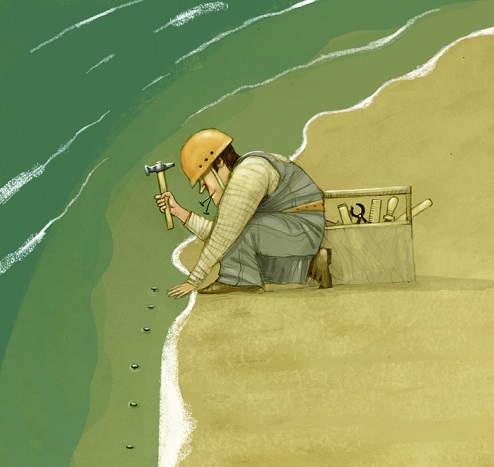
2. Dust increases Greenland’s ice melt
A ‘normal’ Greenland summer melt is illustrated by the left-hand panel taken at 8 July 2012, when about 40% of the ice sheet was subject to melting.
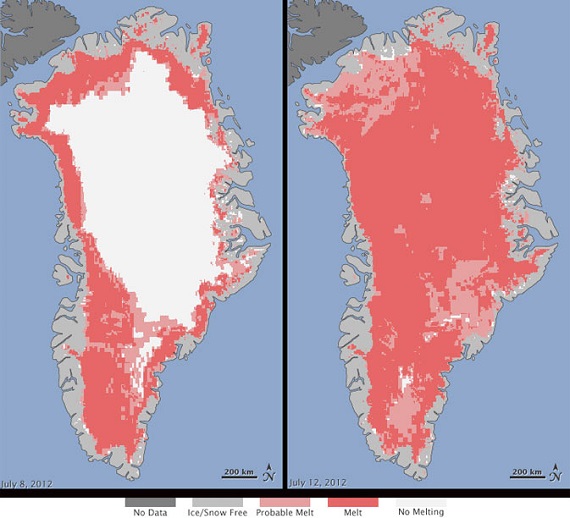
The right-hand panel shows what happened for about a week thereafter and is not relevant except as a harbinger of things to come.
A new study looks at the increased melting from dust and soot. It found that a relatively minor decrease in the brightness of the ice sheet could cause double the average yearly rate of ice loss seen over the period 1992-2010.
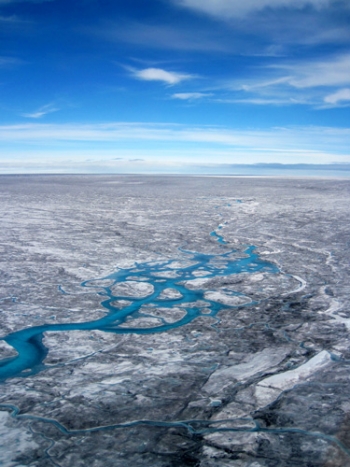
Soot resulting mainly from wildfires in North America and Russia has a greater melting impact than dust as such. However, increased dust is being produced in the Arctic and finding its way to the Greenland ice. Now 150 times as much dust as soot has been found at a site in the north-east.
While this can’t be extrapolated to the rest of the ice sheet, there is concern that Greenland melting could be greater than previously thought. See also Antarctic images for context.
3. Green jobs declining in Australia
Yes green jobs are declining in Australia:
Australia is one of the few places in the world where green jobs are decreasing according to figures released by the International Renewable Energy Agency.
Globally the sector now provides an estimated 6.6 million jobs, an increase of 800,000 from 2013 figures, but in Australia, jobs across solar photovoltaics and solar heating have declined, with up to 22 per cent of jobs lost in PV and 20 per cent in heating, according to Ethical Jobs general manager Michael Cebon.
This is happening:
entirely the result of government policy, both through loss of incentives at the federal level and backpedalling by state governments.
While a structural shift is occurring in the workforce elsewhere, Australia is regressing. The graphic shows the jobs potential of investment in various sectors:
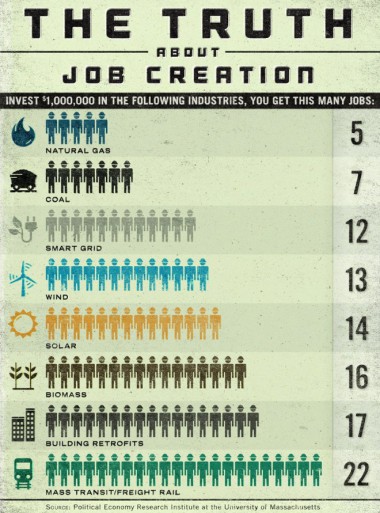
4. Climate change impacts will ‘cost world far more than estimated’
That’s according to Lord Stern. He says that:
the economic models that have been used to calculate the fiscal fallout from climate change are woefully inadequate and severely underestimate the scale of the threat.
That includes those cited by the IPCC. They ignore the science, the full range of risks and simply assume away some of the worst economic impacts.
5. Historians will look back and ask ‘why didn’t they act?’
That’s the question asked by science historian Naomi Oreskes in her
latest book, The Collapse of Western Civilization: A View from the Future, [which] imagines a Chinese scholar in 2393 analysing the slow-motion disintegration of 21st-century democracies as they fail to tackle a growing environmental catastrophe.
It’s not a pretty picture.
By the end of the book, co-written with fellow historian Eric Conway, the Netherlands and Bangladesh are submerged, Australia and Africa are depopulated, and billions have perished in fires, floods, wars and pandemics. “A second dark age had fallen on Western civilisation,” Oreskes writes, “in which denial and self-deception, rooted in an ideological fixation on ‘free’ markets, disabled the world’s powerful nations in the face of tragedy.”
Oreskes and Conway say it’s a worst-case scenario, not a prediction.
One way or another, the game is up, we need to act with vigour and determination.
6. Coal to fuel human progress for decades – Tony Abbott
Our fearless leader has been strutting his stuff on the world stage, ignoring the science and embarrassing us all. He told Texan business leaders that:
we don’t believe in ostracising any particular fuel and we don’t believe in harming economic growth.
“For many decades at least, coal will continue to fuel human progress as an affordable energy source for wealthy and developing countries alike.”
Under the fig leaf of Direct Action anything goes.
Meanwhile Julie Bishop confirms that climate change won’t be high on the G20 agenda.
Once again they are out of tune with the nation. In a recent opinion poll 57% of those polled said the government should take climate change more seriously.
while more than half of respondents felt the federal government was the primary body which should address climate change, there was a negative rating of -18 when people were asked to rank the government’s performance.
This compares to a -1 rating from last year. These rankings are the differential between respondents’ “good” versus’ “poor” response to the government’s performance.
Reminder: Use this thread as an open thread on climate change.
7. Pacific presidents speak out against Australia’s stand on climate change
Out in the Pacific they are not happy with Abbott’s policy stance. The sea is coming up and they are going down. Here’s Fanning Island in Kiribati:
